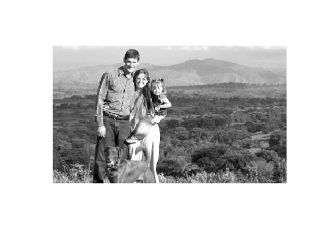The core responsibilities of working as a planner are standard, whether you’re in the Snoqualmie Valley or rural Africa, according to North Bend’s new senior city planner, Mike McCarty.
He and his family returned a few months ago from a three-year mission in Dembi Dollo, Ethiopia, where he worked on community development projects with a focus on food security for the town of 35,000.
“You’re working with a group of citizens to help them set the goals that they have for their lives, and to figure out what steps are necessary to get to those goals. Whether you’re serving a city council here, or you’re working with a group of agriculturists in very rural Ethiopia, it’s the same work,” he said.
Mike served as assistant city planner for the city of Snoqualmie from 1999 to 2005, when he and his wife, Janelle, moved with their daughter, Carolee, then 1 year old, to the East African country.
The family lived in a “comfortable” mud house on the campus of Bethel Evangelical Secondary School, where Janelle taught English. Though they had plumbing, electricity and phone access — when the utilities were working — the McCartys’ “everyday activities of life were very different,” Mike said. “Imagine North Bend 100 years ago.”
The family didn’t have a car, and would walk 45 minutes each way on unpaved roads to a market to buy produce. A lot of time and energy went into preparing food. Simply baking a loaf of bread was a new experience.
“You don’t go and buy flour and sugar and all that,” Mike said. “You buy wheat grains, and grind them. Every step is like that: You’re going from the most raw, unprocessed element, to cleaning and processing and sorting.”
Life in Ethiopia was full and busy, but in many ways simpler than life in the States, he said.
“The things that you’re engaging in, in many ways are more meaningful, because you can relate to people more. It’s not about, do my job, go home, and entertain myself. It’s more about the community working as a whole on problems that they see.”
Mike’s work centered on addressing problems that community members themselves had identified as their most pressing concerns.
“Those usually related to agriculture, veterinary service, health care, environmental degradation. I did a lot dealing with termite infestations and deforestation and overgrazing problems,” he said.
Mike’s development team, made up largely of Ethiopians, would work with government ministries to find solutions, continuously checking in with communities to refine project proposals. Then they’d send proposals to overseas non-profits and churches, hoping they would fund the projects.
Mike learned that throwing money at problems in developing nations doesn’t make them go away.
“Throughout Africa, there’s a big problem with organizations providing solutions — providing food aid, all sorts of technical help — that’s really hindering the self-development of Africa. The people have become dependent in many ways on that aid, so it’s limiting their capacity to develop themselves,” he said.
Richer countries and non-governmental organizations should instead fund education, he said.
When their mission was up, the McCartys did some soul-searching to decide whether to take on a new three-year assignment or return to the United States.
“That was a really difficult decision. We really felt that our heart was in the work there, and people there,” Mike said.
With Carolee almost ready to enter school, and a new son, Isaac, on the way, they opted to come back to the Valley, just a quick drive from Mike’s family in Renton.
They’re excited to be back in the area, and have returned with some lessons Mike plans to apply to work and life.
He learned that outside entities can’t present solutions to a problem. Rather, the community has to identify the solutions, and be in charge of executing them. He’ll apply this knowledge as he works with developers and city officials and staff on both short-range and long-term planning. With North Bend’s development moratorium lifting this fall, Mike’s job will likely be a big one.
“As a planner, I think it’s important that we just be facilitators to the council and the representatives of the city, in aiding and developing the solution to the problems that the city’s facing. I’m not going to push, but I’m going to help facilitate and clarify the dreams of the city as stated through the council and commissions.”
Using this strategy, Mike hopes to help North Bend maintain its friendly feel; he said he loves the fact that he can interact with small business owners regularly and not deal with faceless corporations.
“It will be interesting as the moratorium lifts to make sure that the city be able to hold to its goals, its visions and its character.”
Mike understands firsthand the importance of holding onto values during times of change.
“Being in a culture like Ethiopia, and in a situation where you’re so far removed from a lot of the distractions that we have, really distills what you see as valuable. So that’s what I want to hold to as we come back here: family, faith, community.”
After living in an African society, the McCartys now see American culture through sometimes-critical eyes.
“It’s hard not to be bitter about the materialism in our culture. It just seems so much more out-there now, and so much more media-driven. And that’s difficult for us to re-adjust to,” he said.
Still, Mike wouldn’t trade his experiences for anything, and encouraged others to take similar leaps.
“If anyone has a chance to do any work in an overseas context, jump on it, because it’s really a growing experience. I think we get focused in America on, get through school, get through university, and climb the corporate ladder. But in a lot of places, people will take these little side trips in life, and they’re really rewarding.”


